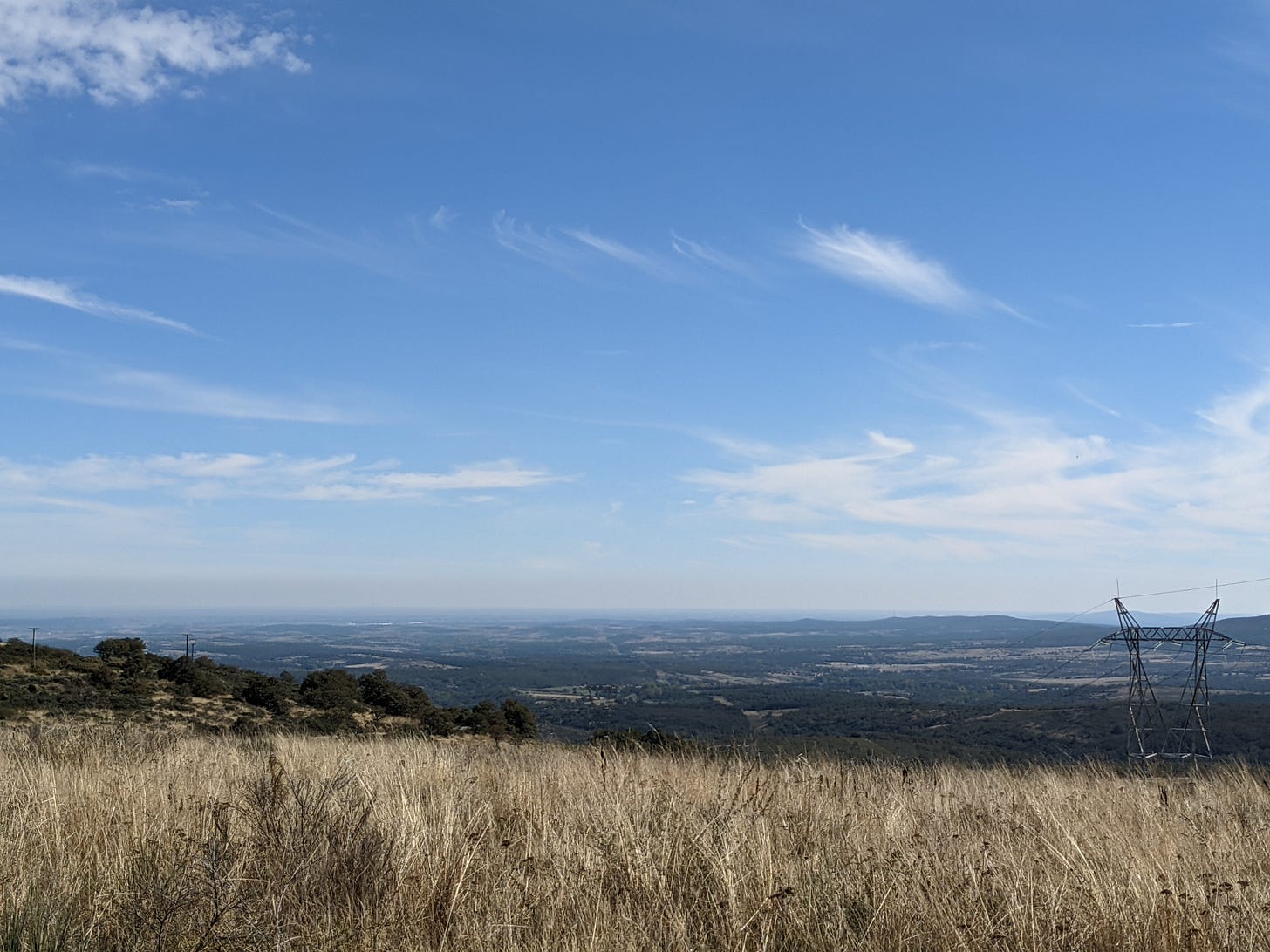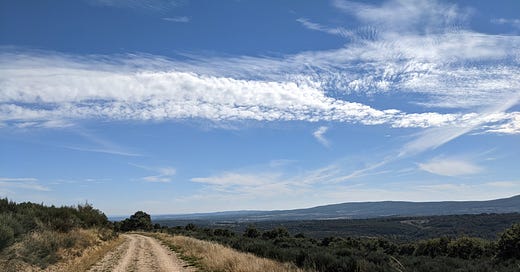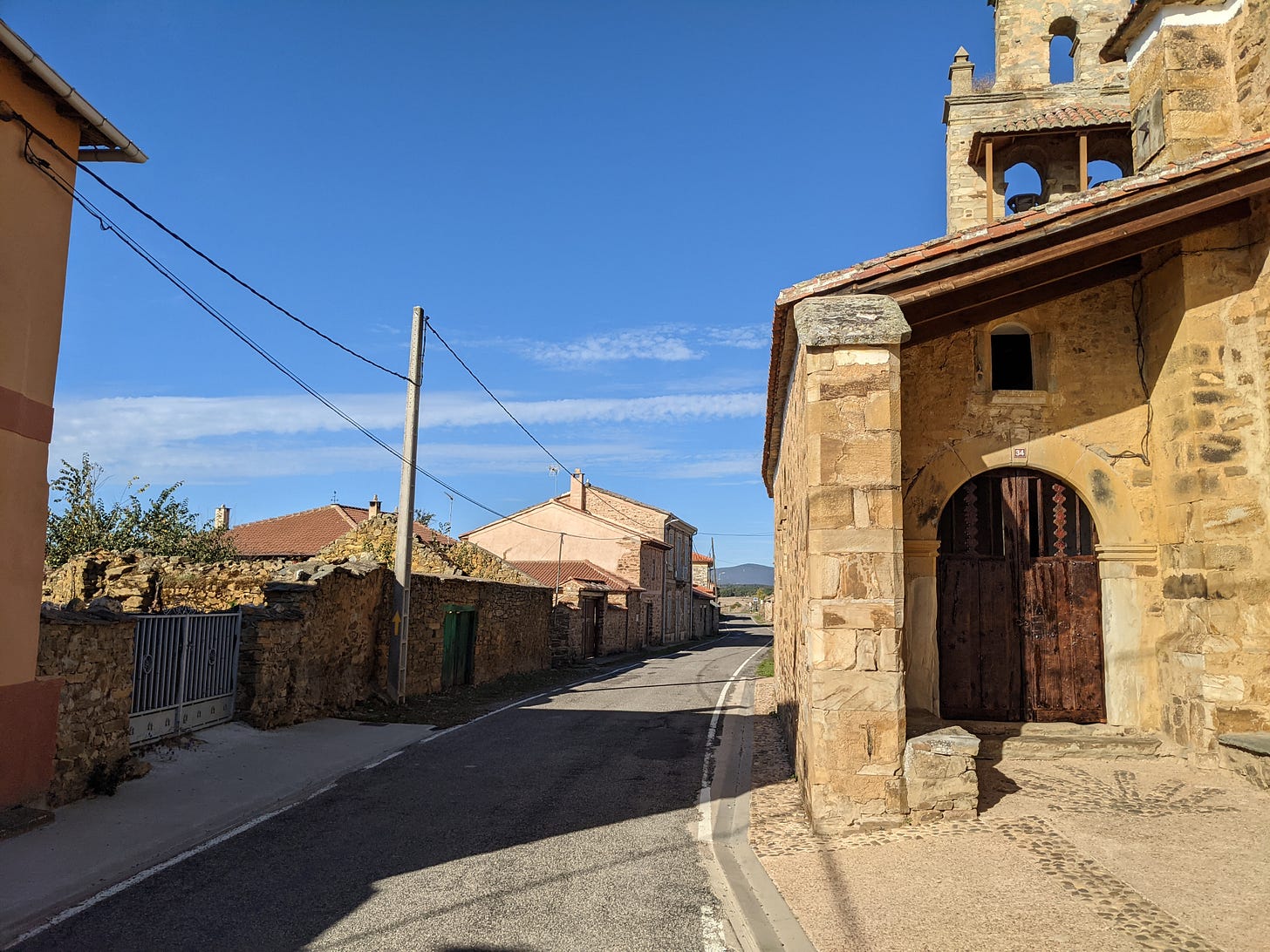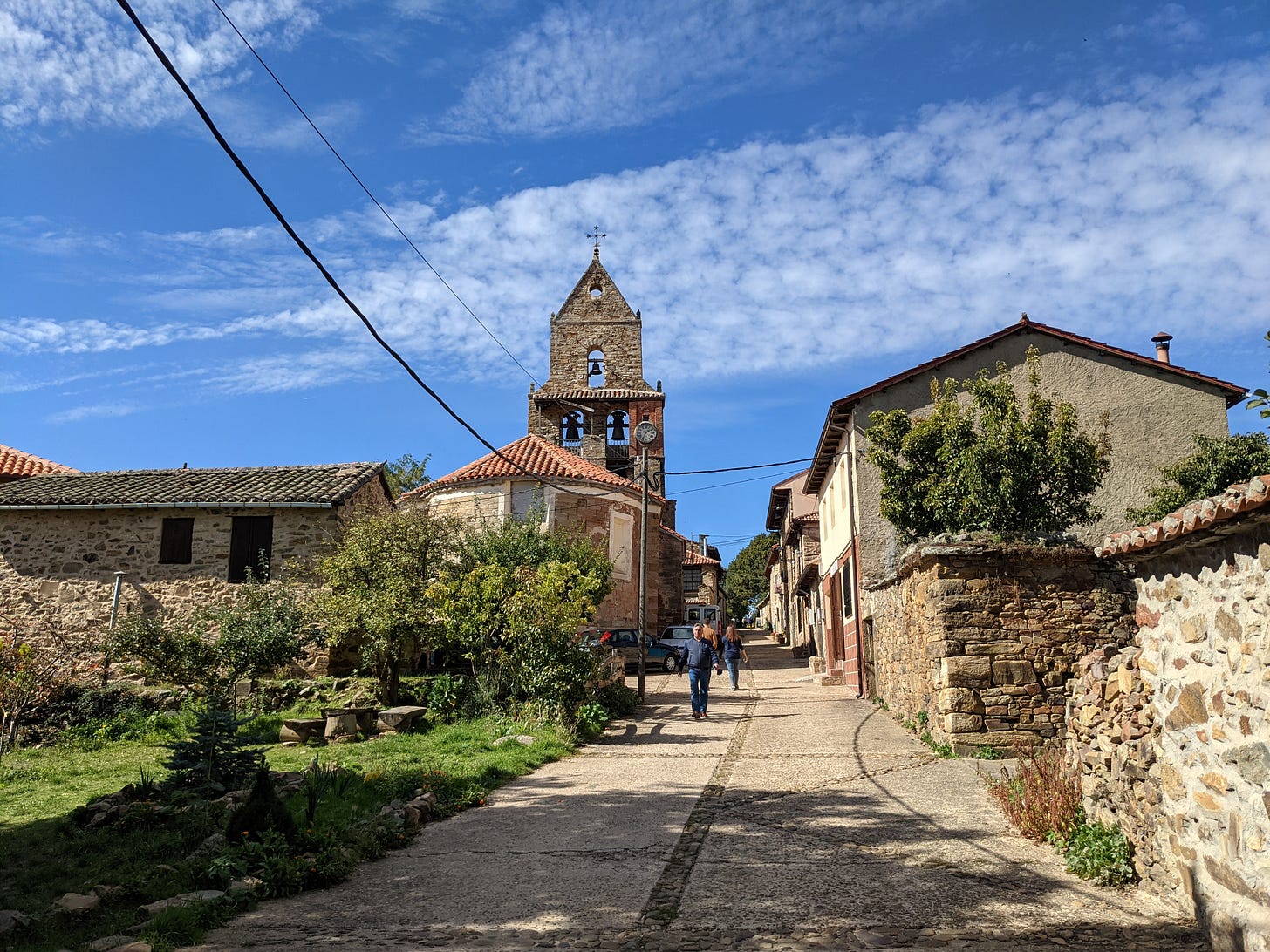Camino de Santiago Day 24: Astorga to Foncebadon
We're finally treated to some proper environmental stimulation, and it has a transformative effect on me: the harder the world, the harder I walk
I’m currently publishing a day-by-day account of my adventure on the Camino de Santiago. If you’d like to keep up with it, or if you’re interested in more stories and essays about travel, the outdoors, physical movement and the journeys they take us on, then Subscribe Now.
To stay up to date with shorter snapshots and more visuals, then follow me over on Instagram:
La Prière
I leave the attic room in the dead of night with everyone else asleep. I stop at the nearest café for a pain au chocolat and a coffee. This is the Way.
A gentle older woman whom I vaguely recognise approaches me as I sit outside a café in the dark, she asks if I speak French.
“Un petit peu.”
She proceeds to tell me that she first saw me about ten days ago, and has seen me several times since. She overheard me talking with a monotone voice so flat it sounded like I was praying. She tells me in the kindest of ways that since then a nickname has stuck in her mind – one of those automatic mental labels that you tend to associate with random people you come across on the Camino – that pops into her head time she’s come upon me:
“La Prière”
“The Prayer”
Nico’s Shoe
Some way up the road I come upon Nico, a wandering French man who’s mostly camping along the Camino. I’ve known him since Castorjeriz, or maybe Burgos or Belorado – it’s hard to tell with some people. He speaks no English but I try my best to practice my French with him; though it’s made difficult by the fact that he seems to speak in a curious mix of French and Spanish, often in the same sentence. My French has gotten more fluent but partly because I seem to have taken to just throwing random Spanish words in there when I can’t think of the French. His gentle speaking manner though always gives the reassuring suggestion of “I’m just going to keep talking, don’t worry about the words, you’ll understand.” Communication is about far more than words.
I meet Nico on the trail wearing his distinctive red baseball cap, carrying his distinctive walking pole, and his distinctive red backpack. His distinctive hunched-over walking posture and hanging assortment of cantinas and pots and pans make him resemble a travelling lamp salesman from Arabian Nights. He’s gesturing that he’s lost something. At first I think it might be one of his bottles, though soon realise he’s talking about his shoe.
Last night I met Nico when I arrived to the albergue in Astorga. He’d just landed outside, and was telling me and another pilgrim with much enthusiasm how he’d managed to avail of a shower in the albergue, but was hitting the road again, preferring to camp as usual. He was excited to show us a pair of coloured moccasins he was wearing – one red and yellow, the other green and red – one of the last pairs ever made in this traditional French style, a gift from his friend.
I realise that not only did I see the shoe a while back the road, but I thought to myself at the time: “Looks like Nico’s shoe” - I was in such a hurry that I never considered that it actually was Nico’s shoe. We go back to find it.
Going against the flow of traffic, we eventually come across a friend waving it in her hand. Nico grabs it and does an almost instant 180 turn – bent over at 30 degrees with his backpack, he has the acceleration and manoeuvrability of an expert forklift driver – before powering off again. I try to keep up with him, but can’t.
I don’t see him again until Foncebadon.
Conditioned to flatness
Yesterday we crossed some kind of hill, and scenery began to creep back into the near environment – trees and hills and so on. We’re about to enter the hills we’ve seen approaching in the distance for several days now – at least 70km away. It’s a satisfying and primal feeling to reach such landmarks on foot having noted them on the horizon several days ago, a true learning experience of the scale of the earth.
Each time I see the mountains or trees peeking out again through the surrounds I get a sense of excitement but also surprise – we’ve been so conditioned to flatness that it’s genuinely unexpected when I look up after even just a few minutes.
A gorgeous technical trail brings us sharply up to the village of Rabanal del Camino. People openly greet the hill with enthusiastic exclamations. Ascending through bushes, stepping over stones and dried-up streams, after spending a week or more in our heads on the flat open road, we are finally back in the embrace of honest-to-god nature, a phrase comes to mind - one normally reserved in reference to spreadsheets and mortgages:
“Back to the real world, eh?”
If you’re enjoying this and think others will enjoy reading about my journey on the Camino, then why not share it?
Radio Camino
I take a break in Rabanal del Camino. Over my sandwich I hear a typical pilgrim conversation at the table next to me. He’s talking about the physical-mental-spiritual thirds of the Camino, and I resolve to never use that expression again. He tells a tale of a familiar acquaintance, and I realise now the extent of the so-called ‘Radio Camino’ – the gossip and whisperings of pilgrims on the trail at a given time, or of lore handed down perhaps over months and years.
It dawned on me a long time ago that you’d hear about people before you’d meet them, and then that people would hear about you long before you’d meet them. You realise that the whole thing is a large soap opera of characters, people walking in and playing a role for a few weeks before being written out, and the talk travels near and wide as people need to get the measure of their lives through observing and discussing the lives of others. In many ways I have seen it build trust, as the open hearts and minds of pilgrims tend to fill such conversations about others with good intentions, even if the nature of execution is inherently small-minded.
Radio Camino is a feature, not a bug, of small and tightly-knitted communities throughout time eternal: trust based on knowing your neighbour’s business. It is neither good nor bad, it simply is what it is. How you interact with it reveals a lot about your own journey: do you feed the beast with your own two cents, or do you observe and accept it for what it is: a beacon that lights many pilgrims’ journeys, by providing an abyss that they can stare into and see themselves reflected out of; that is, if they aren’t swallowed into it first?
We are all just here to wake each other up, after all.
Sunday stroll in Rabanal
Villages are nicer again following Meseta. Lots of stone and bright flowers. As I finish my lunch my instinct tells me it’s Sunday – I’d no cause to know this information before now.
I believe what sets me off is that I’ve noticed several groups of local people by now – families, obviously – strolling down the sloping single main street of Rabanal, one of those built around a church to the extent it serves as a roundabout of sorts in the quiet village centre, walking three, four, five or more abreast, gently ambling, flaneuring even, perhaps to the pub at the end of the street for an afternoon pint, though I believe when they reach the end they turn around.
I’d heard this practice is a feature of life in parts of Italy but seeing it in person was more touching than I’d have thought.
They’re all just families walking together for the sake of it.
And when they get to the end, they keep walking.
Walking Home
A thought as I leave Rabanal: it feels like I’m out for a nice stroll, travelling at my leisure. For the first time rather than feeling like walking is my ‘job’, or that I’m on a mission or a journey, it feels like I’m just out for a Sunday morning hike. I’m gone for a few hours of my own volition, at my own pace, just doing one of my hobbies.
And when I get home this afternoon I’ll bump into the gang, and we’ll ask each other what’s up and we’ll share our stories of the day. Without any effort or planning we’ll all just bump into each other and catch up in the evening to chat about our days, and casually help each other integrate our experiences.
This isn’t just a clever or interesting thought; this is a profound feeling I get in which the entire nature of where I’m at and what I’m doing has been transformed, one of those shifts in perspective where you can feel your worldview changing in real-time as you observe it.
I realise that this evening, even though I’ll be 25 kilometres from where I started,
I’ll be at Home.
King of the Hill
The climb to Foncebadon is steep. There’s 600 metres or so to climb over 5 kilometres. I take my time walking out after lunch and my ankles aren’t sore anymore. Rather than dreading the hill I embrace it. My body and mind are instinctively craving the stimulation, and it seems the more I climb the more energy I get; the more energy I get, the harder I walk. I’m absolutely loving it. I pass by a couple of faces, some old some new, but find the pull of anti-gravity being stronger for once than the pull of human connection.
The sky is clear and the sun baking hot, and it’s the last five kilometres of 25. I’ve run out of water but I feel stronger than ever. I am absolutely buzzing. All physical pain has gone, or at least been overridden; I’m in tune enough with my body by now to know when to ease it up and when to put the foot down, and right now I feel better for walking than I have in a long long time. Each step I reach for a higher piece of ground, I want to climb harder and harder again.
I’m storming it like it’s the Pyrenees all over again.
I’ve left potential walking companions in my wake. I imagine them or others asking “Why are you walking so fast?”, or “Who are you doing this for?”
as so many do on the Camino, though it’s a question not without its own moral judgement, prying questions from a cold amateur psychologist aimed to exact emotional currency from the recipient of the question.
Other times I might think “Maybe…. they’ve a point…”
Have I something to prove?
On a hilltop I see three lads on motorbikes tearing to the top at speed. On another day I’d be jealous. They are brothers in another life. Today however, they don’t get to walk.
I get to Foncebadon at the top and want to rip my shirt off.
I want to scream from the top of the mountain. I look back over the entire Meseta, and see Astorga from where I came this morning in the dark, I see Leon further in the distance from two days ago, and the never-ending plains of my own abyss that we’ve crossed over weeks; it all gets swallowed up by the haze of the sun.
A man in an unknown location whistles a sweet tune.
I feel like I’ve been walking forever, and could walk forever.
500 miles dead set ahead of me, 500 behind, a 1,000 years in perfect symmetry.
Why am I walking so fast?
I’ve no time now for their condescending questions or their smug judgements
I have nothing in prove, not at this stage.
In part it’s a great ‘fuck you’ to anyone who questions why I should;
I can barely think straight, though I can see perfectly, yet have no explanation at all, really, no words;
I’m walking like this because I fucking love it.

Learning How to Walk
The layout of the Camino is no accident. There may be historic and religious stories and reasons for the path following this Way, but surely god envisaged and planned for people to walk in this fashion when he created the world.
The call to adventure, the abyss and the release.
I’ve been walking for 24 days and I think I’ve just learned how to walk.
I’m in no rush; I walk because I want to.
I choose to walk alone but know that I can share it with others later.
I have a destination in mind but the journey is loosely defined.
At the end of the day I will return Home.
Sleeping on the floor
I check one albergue after another, they are all full. Foncebadon is a small village that reminds me of a purpose-built alpine resort. Just ahead is the Cruz de Ferro – the Iron Cross – a famous Camino landmark that attracts non-pilgrim tourists as much as pilgrims, hence the small functional village is entirely booked out.
Nico’s the only man in town - he wants to buy me a beer for helping him find his shoe.
I join a queue for a spot at the municipal albergue. There’s barely any places left – the last ones in the village.
We wait for so long. It feels like he’s pausing for effect rather than some administrative issue. There’s rumours he has some spaces, but only for us, and only on the floor. If there’s no spaces left here I’d have to go back down to Rabanal, or continue on for another 10 kilometres.
As I wait in the shade from the burning sun, I feel no anxiety that the day will end in failure. If I get a place: perfect. If not? Also perfect.
The man comes out. There’s a few spots left on the floor, if we want. It’d be preferable to a bunk bed at this stage.
We wait some more.
I get the last space on the floor.
At this stage it’d be preferable to a bunk bed.
I’ll take it.
I know I didn’t walk too fast today, and I know that also I didn’t walk too slow.
I got here exactly when I was meant to.
If you’ve done the Camino, are thinking of doing it, or are just interested in discussing the Camino or travel in general - then please leave a comment. I’d love to hear from you.






